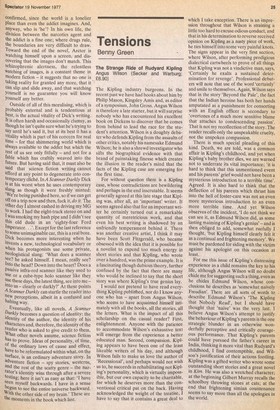Tensions
Benny Green
The Strange Ride of Rudyard Kipling Angus Wilson (Secker and Warburg; £6.90) The Kipling industry burgeons. In the recent past we have had books about him by Philip Mason, Kingsley Amis and, as editor of a symposium, John Gross. Angus Wilson is therefore a late starter, but it will surprise nobody who has encountered his excellent book on Dickens to discover that he comes from behind to lead the race for the stu dent's attention. Wilson is a doughty debater who defends Kipling from the assaults of other critics, notably his namesake Edmund Wilson; he is also a shrewd investigator who sifts the biographical evidence with that brand of painstaking finesse which creates the illusion in the reader's mind that the facts of the Kipling case are emerging for the first time.
For without question there is a Kipling case, whose contradictions are bewildering and perhaps in the end inscrutable. It seems generally agreed at this late stage that Kipling was, after all, an 'important' writer. It seems agreed also that for an important writer he certainly turned out a remarkable quantity of meretricious work, and that even his best writing is shadowed by an unfriendly temperament behind it. There was another creative artist, I think it may have been Scott Fitzgerald, who became obsessed with the idea that it is possible for a novelist to expend too much energy in short stories and that Kipling, who wrote over a hundred, was the prime example. It is a fascinating though dubious theory, further confused by the fact that there are many who would be inclined to say that the short story was where Kipling's true genius lay.
I would not pretend to have read everything Kipling publighed, nor do I know anyone who has — apart from Angus Wilson, who seems to have acquainted himself intimately with all the books, all the stories, all the letters. What is the impact of all this scholarship on the casual reader? First, enlightenment. Anyone with the patience to accommodate Wilson's exhaustive text will emerge from the experience a better educated man. Second, compassion. Kipling appears to have been one of the least likeable writers of his day, and although Wilson fails to make us love the author of 'Recessional', and perhaps would not wish us to, he succeeds in rehabilitating not Kipling's personality, which is virtually imposs ible, but our own capacity to be charitable, for which he deserves more than the conventional critical pat on the back. Having acknowledged the weight of the treatise, I have to say that it contains a great deal to which I take exception. There is an impression throughout that Wilson is straining a little too hard to excuse odious conduct, and that in his determination to reverse received ' opinion on Kipling as a nasty piece of work, he ties himself into some very painful knots. The signs appear in the very first section, where Wilson, after performing prodigious dialectical cartwheels to prove of all things that Kipling was not a vindictive man, says, 'Certainly he exalts a sustained determination for revenge'. Professional debaters will note that use of the word 'certainly' and smile to themselves. Again, Wilson says that in the story 'Beyond the Pale', the fact that the Indian heroine has both her hands amputated as a punishment for consorting with an English officer is secondary to 'overtones of a much more sensitive blame that attaches to condescending passion'. That is not my recollection of the story. The reader recalls only the unspeakable cruelty, not the unspoken compassion.
There is much special pleading of this kind. Death, we are told, was a common affair in Kipling's childhood, and yet when Kipling's baby brother dies, we are warned not to underrate its vital importance; it is hard to think that this unmentioned event and his parents' grief would not have been a mysterious introduction to a terrible time'. Agreed. It is also hard to think that the deflection of his parents which thrust him into the hell of foster-care was not an even more mysterious introduction to an even more terrible time. And yet Wilson observes of the incident, 'I do not think we can see it, as Edmund Wilson did, as some lasting maiming of Kipling's genius' — and is then obliged to add, somewhat ruefully I thought, 'but Kipling himself clearly felt it as a continual and frightening memory'. We must be pardoned for siding with the victim against his apologist on this occasion at least.
For me this issue of Kipling's distressing experience as a child remains the key to his life, although Angus Wilson will no doubt chide me for suggesting such a thing, even as he chides Edmund Wilson, whose conclusions he describes as 'somewhat naively Freudian'. There are all sorts of words to describe Edmund Wilson's 'The Kipling that Nobody Read', but I should have thought that 'naive' was the very last. I believe Angus Wilson's attempt to justify the behaviour of Kipling's parents is the one strategic blunder in an otherwise wonderfully perceptive and critically courageous performance. That Kipling's parents could have pursued the father's career in India, thinking it more vital than Rudyard's childhood, I find contemptible, and Wilson's justification of their actions footling. Kipling was a gifted writer who wrote some outstanding short stories and a great novel in Kim. He was also a wretched character; at the beginning Gilbert Murray recalls the schoolboy throwing stones at cats; at the end that frightening simian countenance seems to say more than all the apologies in the world.


































 Previous page
Previous page